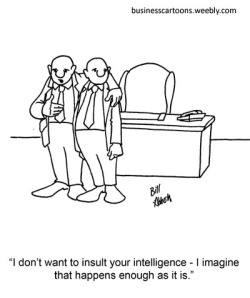If ever you seek advice in cartooning, and you’re told it’s easy money, or you can make quick cash, walk away. Don’t look back, don’t seek an expansion of the initial remarks, don’t waste another moment, just walk away. Being a successful cartoonist, like being a successful anything else on this planet, takes hard work, and lots of it over a significant period of time.
The opening remarks should also be balanced with this: it IS (in my humble opinion) the best job in the world. Despite the nay-sayers out there, you can still make a respectable, even propserous living as a cartoonist. I, like many now, spend too much time browsing Facebook, and as might be expected, many of the people I’m connected with are cartoonists, both of the amateur variety and the professional sort. I see over and over cartoonists lamenting how it’s a dead industry, all doom and gloom. It isn’t true. Will it be easy? Nope. Will it follow the same old syndicate model? I doubt it. Will it require innovation and perseverance? Absolutely. And good old-fashioned hard work, and lots of it. But there are others who are paving the roads of possibility, and there’s a whole lot more territory as yet unexplored.
Just one example: webcomics. Take a look at the enormous success of Penny Arcade, PVP, and Starslip – and there are an increasing number of others who make a very handsome living at cartooning, having successfully reinvented their version of the wheel. It’s an exciting and potentially lucrative time to follow the in the footsteps of the webcomics pioneers. Something I HIGHLY recommend to cartoonists seeking success: the film documentary “Stripped” by Dave Kellett – all about the changing world of comics.
There is still potential for success in traditional syndication – it’s just a great deal more difficult than in the past. The remaining major newspaper syndicates take on fewer features than ever, and they’re selling to a shrinking market of financially struggling newspapers. From what I’ve read recently though, the industry has stopped the massive hemorrhaging and has found firmer ground on which to stand to face the future. And if newspapers are to survive, they need engaging content. In part, that’s us. In my own case, I’m very happy to report that my single panel comic, “Spectickles” is finding a home with an increasing number of newspapers in North America – so I know for a fact that the game is far, far from over.
If traditional syndication doesn’t work, self syndication remains a viable, if not labor-intensive possibility. If I might make a recommendation to those who are considering this route, start with the newspapers in your own back yard: city papers, weeklies, alternative papers – anything regularly distributed to the local population. You’ll have an enormous advantage over national content, and you can make an appointment with staff to connect with them in a more human, rather than digital way.
Another path I’ve finally gotten moving on is creating my own cartoon ecommerce site, where my business cartoons, “Percenters”, which have appeared in the Wall Street Journal and the Harvard Business Review are available for newsletters, Powerpoints, and a myriad of other uses – all easy to purchase inexpensively, and for me, all automatically. If you’ve created a large body of work that isn’t currently being used, an ecommerce site might be the way to go. You can go with a free site or add bells and whistles and automation as your finances allow.
The last subject I’ll touch on is traditional magazine submissions. Don’t discount going old school with your cartooning – some of these markets pay a great deal of money and earn you street cred you can’t get anywhere else. Additionally, by getting yourself on a regular, and therefore competitive submission schedule, you hone your gag-writing and drawing skills. You also pick up something in the way of perseverance and the ability to handle rejection – critical to anyone who hopes to succeed in this business.
All of the above is intended to help my fellow cartoonists in a meaningful, direct, and actionable way. It’s my sincere belief that the more of us succeed, the greater opportunities for all of us in the near and long term. And the more of us that are educated in terms of rights, and the value of our work, the better chances our industry has for surviving. Profitably.
Here’s a few resources that might help get things started:
Webcomics: Tools and Techniques For Digital Cartooning
Unnatural Talent: Creating, Printing and Selling Your Comic in the Digital Age


![mqdefault[9]](http://billabbottcartoons.files.wordpress.com/2014/04/mqdefault9.jpg?w=300&h=168)

